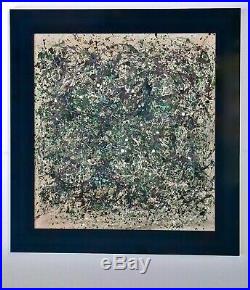JACKSON POLLOCK – A 1940s SIGNED ABSTRACT EXPRESSIONIST DRIP PAINTING, HISTORY














WELCOME TO OUR ART-MODERNE. TO CLEAR OUR INVENTORY. ALL ARTWORKS ARE NOW. 70% to over 80% OFF! YES, THAT’S ON EVERYTHING!! AND WE ARE OPEN TO OFFERS!! (Untitled; Framed) Circa late-1940s SIGNED. (This artwork came without any official COAs or gallery documents attached, hence it is offered in our Sale “as is”). Paul Jackson Pollock (January 28, 1912 August 11, 1956), known as J ACKSON POLLOCK , was an influential American painter and a major figure in the ABSTRACT EXPRESSIONIST movement. During his lifetime, Pollock enjoyed considerable fame and notoriety. He was regarded as a mostly reclusive artist. He had a volatile personality , and struggled with alcoholism for most of his life. In 1945 , he married the artist L EE K RASNER , who became an important influence on his career and on his legacy. Jackson Pollock developed what was later called his “drip” technique , turning to synthetic resin-based paints called alkyd industrial enamels (also known sometimes as industrial acrylic paints), which, at that time, was a novel medium. Pollock described this use of household paints , instead of artists paints, as a natural growth out of a need. He used hardened brushes, sticks, and even basting syringes as paint applicators , as well as allowing paint to pour (or drip) directly from the hand-held, moving can via a hole punched into the can’s bottom. Pollock’s technique of pouring and dripping paint is thought to be one of the origins of the term ACTION PAINTING. With this technique, Pollock was able to achieve a more immediate means of creating art, the paint now literally flowing from his chosen tool onto the canvas. By defying the convention of painting on an upright surface, he added a new dimension by being able to view and apply paint to his canvases from all directions. In the process of making paintings in this way, he moved away from figurative representation , and challenged the Western tradition of using easel and brush. He also moved away from the use of only the hand and wrist, since he used his whole body to paint. In 1956 , Time magazine dubbed Pollock “Jack the Dripper” as a result of his unique painting style. Pollock vehemently denied “the accident”; he usually had an idea of how he wanted a particular piece to appear. His technique combined the movement of his body, over which he had control, the viscous flow of paint, the force of gravity, and the absorption of paint into the canvas. It was a mixture of controllable and uncontrollable factors. Flinging, dripping, pouring, and splattering, he would move energetically around the canvas, almost as if in a dance, and would not stop until he saw what he wanted to see. It is only after a sort of’get acquainted’ period that I see what I have been about. I have no fear of making changes, destroying the image, etc. Because the painting has a life of its own. I try to let it come through. It is only when I lose contact with the painting that the result is a mess. Otherwise there is pure harmony, an easy give and take, and the painting comes out well. Pollock’s most famous paintings were made during the “drip period” between 1947 and 1950. He rocketed to popular status following an August 8, 1949, four-page spread in Life magazine that asked, Is he the greatest living painter in the United States? Pollock died at the age of 44 in an alcohol-related car accident. In December 1956 , he was given a memorial retrospective exhibition at the M USEUM OF MODERN ART (MoMA) in New York City , and a larger more comprehensive exhibition there in 1967. More recently, in 1998 and 1999 , his work was honored with large-scale retrospective exhibitions at MoMA and at T HE TATE GALLER Y in London. This extraordinary ABSTRACT-EXPRESSIONIST DRIP or SPLATTER PAINTING is made in various colors (predominantly green, white, black and brown) on a raw, unprimed canvas. The painted canvas, on its original old stretchers , measures: 29″ x 27″ (73 3/4 cm x 68 3/4 cm). Presented in a deep, lacquered-finish, black-wood, museum-quality frame measuring: 35 1/2″ x 33 1/4″ x 1 1/4 deep (90 cm x 84 1/2 cm x 3 1/2 cm deep). It is SIGNED , on the right-side of the lower front-edge, in black: J. Not dated, circa late 1940s. The painting is absolutely an ORIGINAL PAINTED WORK on canvas; NOT a print or lithograph or any other kind of reproduction. In VERY GOOD CONDITION. Pollock’s spontaneous compositional skills are wonderfully exemplified in this terrific EXPRESSIONIST drip / splatter work on canvas. Of course, much controversy always surrounds what may be an important Jackson Pollock find… All offers and sales will be considered on that basis. We do have PROVENANCE available. SPECIAL NOTE : The very old, original wood stretchers have been matched to the wood used in parts of Jackson Pollock’s barn-studio and surrounding yard. Samples of paint on the stretchers also correspond to paint residue found in the Pollock studio. Research undertaken by one of the previous owners and offered here as additional information. Please ask any questions before the close of our Sale period. We have MASSIVELY DISCOUNTED this rare and UNIQUE signed original work to way below normal market values. Now DISCOUNTED lower even than our usual below-market pricing!! Now over 86% OFF!!! Only during our SALE!! Or, make us a “BEST OFFER” if you prefer. And via trackable UPS Ground for the mainland United States. We can also accept bank-to-bank wire payments from overseas as well as American-only personal and company checks. All payments must be in U. All auctions and sales are final. Thank you for visiting our Art-Moderne Gallery Auctions & Sales online! The item “JACKSON POLLOCK – A 1940s SIGNED ABSTRACT EXPRESSIONIST DRIP PAINTING, HISTORY” is in sale since Saturday, February 1, 2020. This item is in the category “Art\Paintings”. The seller is “art-moderne” and is located in Beverly Hills, California. This item can be shipped worldwide.
- Region of Origin: US
- Artist: Jackson Pollock
- Style: Abstract Expressionist
- Listed By: Dealer or Reseller
- Quantity Type: Single-Piece Work
- Painting Surface: Canvas
- Medium: Acrylic Enamel on Canvas
- Date of Creation: 1900-1949
- Original/Reproduction: Original
- Signed?: Signed
- Year: Late-1940s
- Features: Framed
- Width (Inches): 33 1/4 inches
- Subject: Abstract Expressionist Drip Painting
- Originality: Original
- Height (Inches): 35 1/2 inches


 D5 Creation
D5 Creation
Comments are Closed